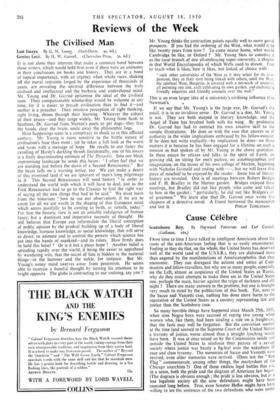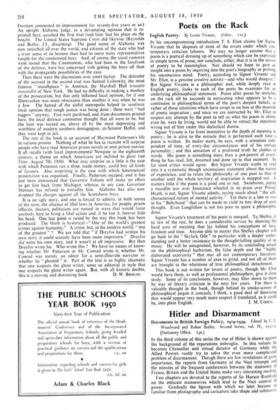Cause Celebre ,
FROM time to time I have talked to intelligent Americans about the roots of the anti-American feeling that is so easily encountered. Feeling as they do that, on the whole, the United States has deserved well of the world (and of the U.S.S.R.), they are distressed more than angered by the manifestations of Americanophobia that they encounter. They can disregard the actions and antics of Com- munists and fellow-travellers, but why are so many people,. especially on the Left, almost as suspicious of the United States as Russia, why do they resist attempts to make them see in the United States one, perhaps the main, barrier against the reign of darkness and old night ? There are many answers to the problem, but one is brought very much to mind by the publication of this book. For, next to the Sacco and Vanzetti case, nothing has done more harm to the reputation of the United States as a country representing law and justice than the Scottsboro case.
So many horrible things have happened since March 25th, 1931, when nine Negro boys were accused of raping two young white women who, like them, had been stealing a ride on a freight-car, that the facts may well be forgotten. But the conviction seemed at the time (and seemed to the Supreme Court of the United States) a travesty of justice, worse almost than a straight lynching would have been. It was at once seized on by the Communists inside and outside the United States to reinforce their picture of a savage society where justice was barely a fig-leaf over the nakedness of race and class tyranny. The memories of Sacco and Vanzetti were revived, even older memories were revived. (Does not the " Red Flag " commemorate, among other things, the martyrdom of the Chicago anarchists ?) One of those endless legal battles that are, in a sense, both the pride and the disgrace of American law began. (The disgrace is obvious enough ; the pride is less obvious, but in a less legalistic society all the nine defendants might have been executed long before. True, even Senator Heflin might.have been willing to see the sentences of the two defendants who were under
fourteen commuted to imprisonment for seventy-five years or so.) An upright Alabama judge, in a devastating opinion that is re- printed here, quashed the first trial (and later lost his place on the bench). The United States Supreme Court did likewise (Reynolds and Butler, kJ., dissenting). The good name of Alabama was now smirched all over the world, and citizens of the state who had a truer sense of its honour than had its more noisy representatives fought for the condemned boys. And, of course, the usual rumours went round that the Communists, who had been in the forefront of the defence, were less concerned with getting the boys off than with the propaganda possibilities of the case.
Then there were the discussions over court tactics. The defender of the accused in the second trial was Samuel Leibowitz, the most famous " mouthpiece " in America, the Marshall Hall (mutatis trzutandis) of New York. He had no difficulty in making a monkey of the prosecution, but that only inflamed local opinion, for if one Damyankee was more obnoxious than another it was when he was a Jew. The hatred of the sinful metropolis helped to reinforce local opinion that rough justice was being done ; these were " bad niggers " anyway. Five were pardoned, and, from documents printed here, the local defence committee thought that all were to be, but the heat was turned on, above all by the most depressing and worthless of modern southern demagogues, ex-Senator Heflin, and they were kept in jail.
The rest of the book is an account of Haywood Patterson's life in various prisons Nothing of what he has to recount will surprise people who have read American prison novels or seen prison movies. It all recalls (with local improvements) Newgate in the eighteenth century, a theme on which Americans are inclined to gloat (see Time, August 7th, 1950). What may surprise us a little is the ease with which Patterson ran a shop, made money, could buy all kinds of favours. Also surprising is the ease with which heterosexual prostitution was organised. Finally, Patterson escaped, and it has just been announced that Governor Folsom will make no effort to get him back from Michigan, whence, in any case, Governor Mennen has refused to extradite him. Alabama has also now dropped the charges against all the Scottsboro boys.
It is an ugly story, and one is forced to admire, in both senses of the term, the absence of libel laws in America, for people, prison officials, doctors, politicians are named in ways that would force anybody here to bring a libel action and, if he lost it, forever hide his head. One last point is raised by the way this book has been produced. The blurb is hysterical—" One of the world's greatest crimes against humanity." A crime, but, in the modern world, " one of the greatest " ? We are told that " if Dreyfus had written his own story it could scarcely have been more impressive." Dreyfus did write his own story, and it wasn't at all impressive. But then Dreyfus wrote his. Who wrote this ? We have no means of know- ing whether Mr. Patterson or Mr Conrad wrote it, whether Mr. Conrad was merely an editor for a semi-illiterate .narrator or whether he " ghosted " it. Part of the text is so highly idiomatic that one suspects the ghost writer, some so editorial in style that one suspects the ghost writer again. But, with all historic doubts,
this is a moving and distressing book D. W. BROGAN.



































 Previous page
Previous page